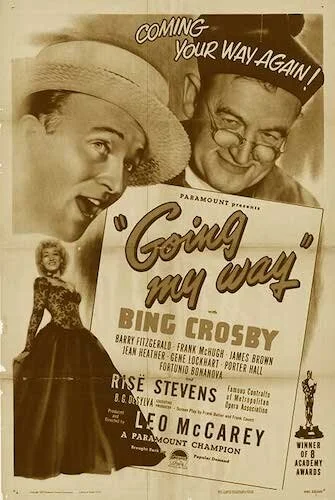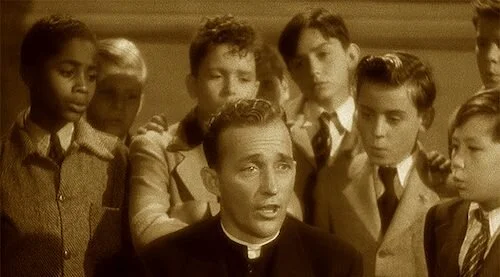Going My Way
This review is a part of the Best Picture Project: a review of every single Academy Award winner for the Best Picture category. Going My Way is the seventeenth Best Picture winner at the 1944 Academy Awards.
How? How did this film beat Double Indemnity and Gaslight, in the first year that Best Picture was stripped down to a solid five nominees only? How did this film get seven Oscars? It isn’t even the best Bing Crosby film! Well, 1944 was clearly a weird year. You’d think that the Academy Awards would have established an identity this far into its existence. No more films winning Best Picture as its sole nomination. No more three nominations only for a major category. Everything was coming into its own. Casablanca and Gone With the Wind were selected, as well as an eccentric selection like Rebecca. Why am I raising such a stink? Going My Way is not the worst Best Picture winner ever.
I’d argue it suffers a bigger problem. Going My Way is the least Best Picture film to ever win Best Picture. Even the worse films make more sense: Cimarron has its fantastic opening. The Greatest Show on Earth operated on a large scale, despite its stupidities. Going My Way is borderline limp: it’s as if How To Lose a Guy in 10 Days or Hairspray (the 2007 one) won Best Picture. These aren’t god awful films by any means, but they make very little sense. These are the best films of the year? No. They’re not. And neither was Going My Way; it wasn’t even close. It wasn’t even Leo McCarey’s best film! The guy made Duck Soup, The Awful Truth, and Make Way For Tomorrow, and Going My Way is his Best Picture film. It’s crazy.
It’s like the Academy being transfixed by Bing Crosby.
And yet, the Academy was absolutely nonplussed by the film. The film drew such a buzz, Barry Fitzgerald was nominated twice for the exact same role (winning Best Supporting Actor, but losing Best Actor to Bing Crosby for, well, this same film). If there’s one good thing that came out of this year, it was the new regulations to discern a supporting role from a leading role, as to not repeat the same mistake. Otherwise, we have a Crosby vehicle that broke box offices, and that’s it. He plays a priest that turns a bunch of juvenile delinquents into a soothing, angelic choir. He deals with naysayers, freak accidents, and his own self doubts. Yet, he always perseveres. That’s basically it.
Aside from the initial moment where you hear the choir hit a note in tune (which, I have to be honest, is quite magical), Going My Way is safe, and it kind of just exists. There isn’t much takeaway here, outside of “anyone can change” and “you can find good in your heart”. Let’s be honest. The film did well because of Crosby’s charm. The guy was one of the biggest celebrities that could do it all. Does that equate to having a fantastic film? No. We never saw Charlie Chaplin win Best Picture, and he was far more deserving than this film was. It’s just one of those instances, where popularity and a zeitgeist overtook pure integrity. Give Crosby Best Actor if you want. Going My Way winning was a sign that this critical design was far from perfect, and that a non-threatening film could pierce through the golden gates of the Academy. It was a harbinger of Oscar bait-y films that were to come years later. Hype was enough, and Going My Way invited many films to follow suit eons before that was fashionable.
Andreas Babiolakis has a Masters degree in Film and Photography Preservation and Collections management from Ryerson University, as well as a Bachelors degree in Cinema Studies from York University. His favourite times of year are the Criterion Collection flash sales and the annual Toronto International Film Festival.





